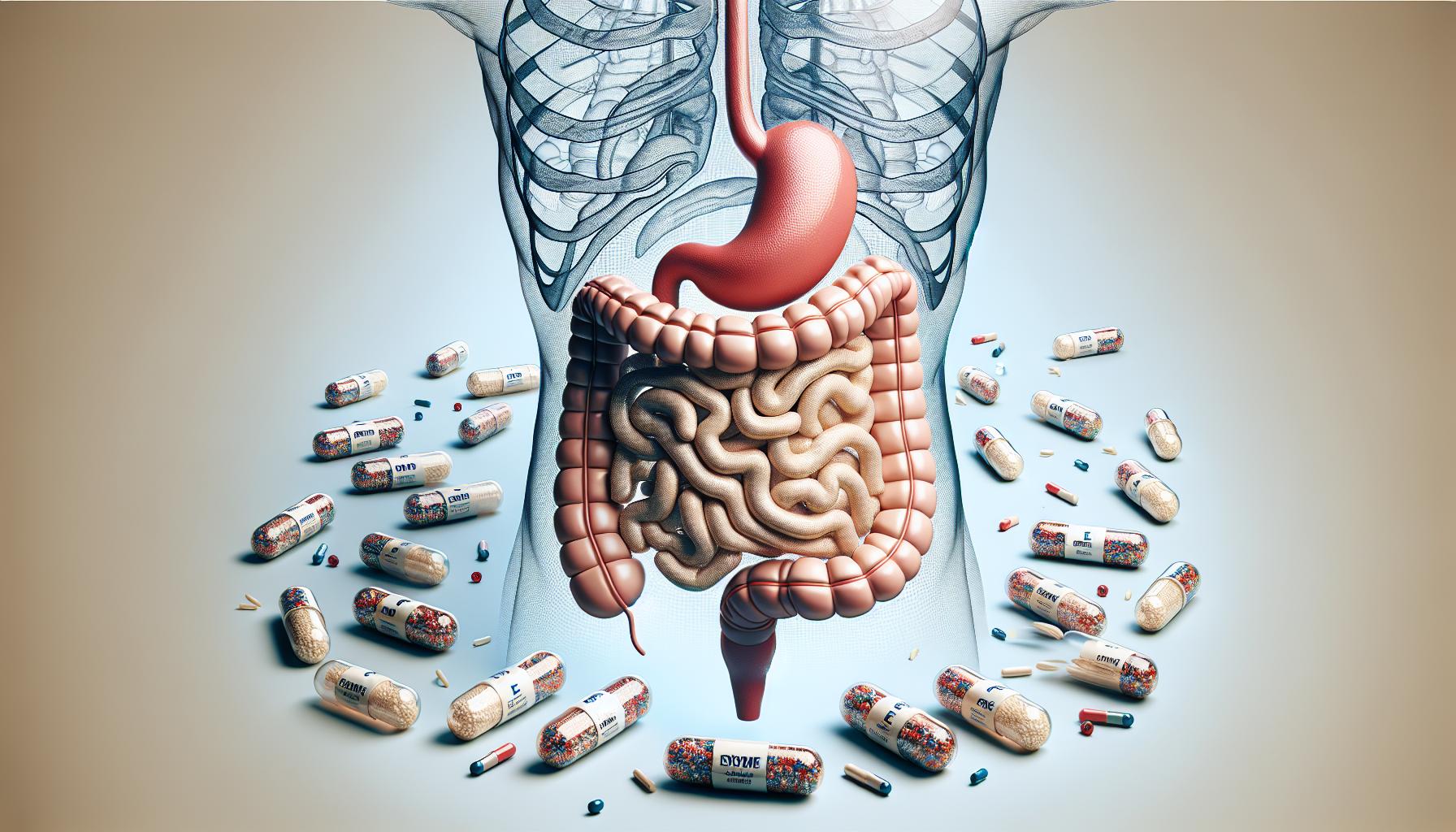
An Up-Close Look at Digestive Enzymes and Your Eating Schedule
Navigating the realm of health and wellness, you may find yourself wondering, “How long before eating should I take my digestive enzymes?” To keep things crystal clear, digestive enzymes serve our body best when consumed right before meals. This timing creates an environment for optimal digestion and absorption of nutrients from your food. However, the timing alone is only the tip of the iceberg. The impact of digestive enzymes, the factors affecting their use, and their role in our overall health tell a captivating tale worth exploring.
Understanding and Utilizing Digestive Enzymes
Digestive enzymes, nature’s microscopic maestros, orchestrate the symphony of our digestion process. These virtuosos break down food into smaller, absorbable components, ensuring a smooth and efficient harmony of digestion. And when the melody of digestion hits the right notes, a wealth of benefits like improved nutrient absorption, enhanced energy levels, and bolstered gut health usually follows suit.
From proteins to carbs and delightful desserts, various foods require unique digestive enzymes to decode their nutritional secrets! Hence, considering the type of meal while deciding the suitable digestive enzyme supplement can heighten their efficacy.
The Importance of Timing
In the chronicles of digestive enzymes, timing is a crucial character. Incorporating digestive enzymes right before meals orchestrates an environment poised for prompt and effective digestion. This primed stage expedites the process of food breakdown, promoting swift and efficient nutrient absorption.
Factors Affecting The Use of Digestive Enzymes
Although consuming digestive enzymes before meals is the generally advocated approach, it’s not a one-size-fits-all scenario. Your body’s unique choreography of digestion, present health conditions, and the nature of your guidance from healthcare professionals can steer this strategy in different directions. After all, our body’s rhythm can dance to a distinct tune that deviates slightly from the cookie-cutter norm.
The Personalized Path
Those navigating health complications such as pancreatic conditions or certain food intolerances might receive advice to adjust their digestive enzyme intake around meal timings. In these scenarios, it’s best to let the expert advice guide you rather than strictly adhering to the general rule of thumb. Hence, while the general convention casts a broad layout, personalized consultation can fine-tune the timing for optimal results.
The Relationship Between Digestive Enzymes and Overall Health
The contribution of digestive enzymes leaps beyond efficient food breakdown. These microscopic maestros converse with our overall health in numerous ways. Enriching our nutrient intake, sidestepping uncomfortable digestive symptoms, and supporting a healthy gut are just a few ways these enzymes pull their weight in our health journey.
The Bridge to Nutrient Paradise
Are you crossing your fingers for a vibrant health tableau? One filled with abundant energy and robust immunity? Digestive enzymes can step in as your supporting stars. By unlocking the doors to a trove of nutrients in the food you eat, these enzymes can paint a promising health landscape.
The Last Bite: Digestive Enzymes and Your Diet
To answer the pressing question, “How long before eating should we take digestive enzymes?” — tick tock — time it just before your meals. But remember, this is a general guideline. Your personal health journey may encourage a touch of nuance to this binding rule.
Frequently Asked Questions
Q1: Should I take digestive enzymes with every meal?
A1: Yes, taking digestive enzymes with each meal can be beneficial unless otherwise advised by your healthcare professional.
Q2: Are there any side effects to taking digestive enzymes?
A2: When taken appropriately, digestive enzymes are generally considered safe. However, some individuals may experience minor side effects such as gas, bloating, or stomach discomfort.
Q3: What happens if I forget to take my digestive enzymes before eating?
A3: While optimal results are achieved when taking digestive enzymes before meals, forgetting occasionally shouldn’t significantly hamper your digestion.
Q4: Can taking digestive enzymes help with specific food intolerances, such as lactose intolerance?
A4: Yes, certain digestive enzymes can assist in breaking down specific food substances that trigger intolerances, such as lactase for lactose intolerance.
Q5: Does the type of food I eat influence which digestive enzyme supplement I should take?
A5: Different enzymes break down different types of food. For instance, proteases break down proteins, lipases work on fats, while amylases handle carbohydrates. Hence, your meals do influence the kind of digestive enzymes that will be most efficient.

